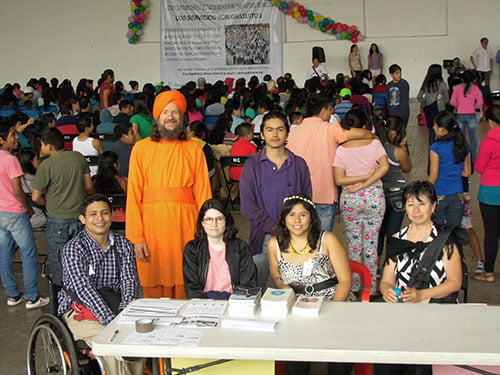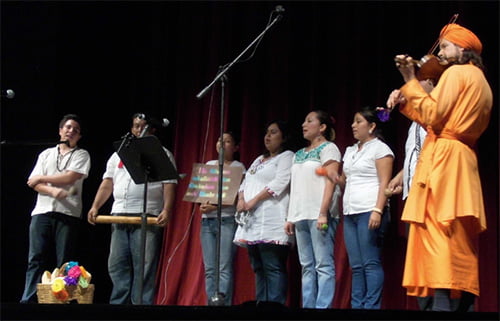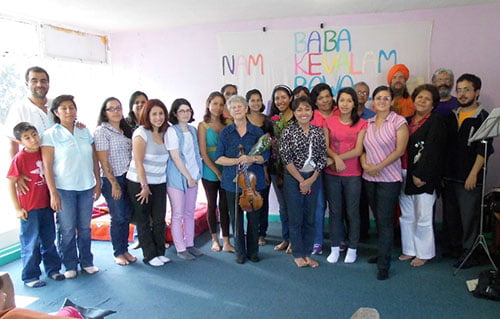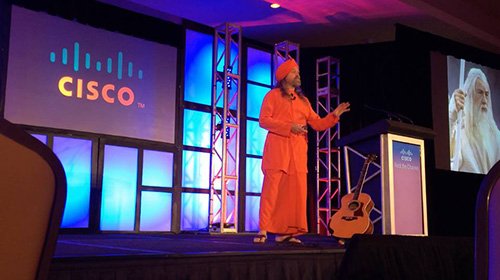Haiti
Didi Ananda Jiivaprema is on a mission in Haiti

Didi Ananda Jiivaprema is on a mission in Haiti


A program for the promotion of adolescent health held at the Auditorium Cuernavaca introduced 1,000 young people from various institutions around the city to natural health techniques.

Dada Divyalokehananda was the celebrated guest at the biggest theatre in Cuernavaca called Theatre Ocampo Cuernavaca.


Dada Nabhaniilananda appeared at TEDx Upper East Side, and more recently gave a presentation on meditation at Facebook HQ in Silicon Valley and a keynote address at the 2014 CISCO distributors conference in Arizona.


Dada Vedaprajinananda has been giving lectures in Kalamazoo, Michigan, a meditation workshop and concert in Eureka Springs, and musical performances at the Champaign County Nursing Home, the Swann School, the Clark Lindsey Retirement Home, and most recently at Head Start in Champaign.
Here Dada performs at the Urbana farmers’ market:

The latest retreat in the San Francisco Bay Area was a huge success:

Cleaning up the highway in Missouri:

AMURT runs prison programs in a variety of places. We teach inmates yoga and meditation, and help them get their lives together so they can tolerate prison better, and when they get out they stay out.
A recent study found that the reincarceration rate was only 8% for those who took Acarya Pashupati’s class 4 times, versus 25% for those who took it less often. The usual rate is often 50-70%. AMURT has led programs in four men’s and women’s prisons near Raleigh NC, led by Shiva Steve Ordog, and several in Haiti as well, led by Manavendra and Vishvamitra. At the last class in Women’s Prison in Port-au-Prince, the ladies in Vishvamitra’s class did not want to open their eyes after the meditation, the vibration was so strong. Other programs are being run in San Quentin prison in California, and also in Florida, led by Lawrence Huff. We are looking for more people to expand this program around the world. A $1,000 prize is being offered to the first person or team who can open up 10 more programs within the next year, and keep them running for 6 months.

From Ray Rainjan Guthrey:
I was a psychologist/counselor for the California Department of Corrections for 26 years, beginning in 1983. I was able to submit a program for approval to the Director of Corrections in 1999 to allow me to have a regular yoga/meditation program developed by and for prison inmates. Our program was approved in late 1999 under the umbrella of the SAP (substance abuse program) on a maximum-level prison yard at Sierra Conservation Center, Jamestown California. We called our program the Inner Awareness Group, thereby avoiding any religious connotation. The supervisors of the SAP also approved the program as a therapeutic tool in combating substance abuse.
Our program consisted of asanas, kiirtan, sadhana and workshops including non-violent communication, tantric philosophy and more. We enjoyed 5 years with a core group of 30 or more high custody inmates. One inmate in particular, Vishvanath, became a great practitioner and ten years after initiation was given his parole. He now resides in Fresno, California with his wife who has also become a margi.



Presenting Prout at the Economic Democracy Conference
by Dada Maheshvarananda
One year ago, a group of 15 Proutists scattered across the United States (and me in Venezuela) began organizing a conference on Economic Democracy. Believing that the demand for economic democracy that economically empowers people and communities has the potential to unite people around a common cause that replaces the tyranny of corporate power, our goal was to “unite the moralists”. We chose Madison, Wisconsin as our site and created a website with all the 12 talking points written by Proutists to convey our ideas.
After an inspiring weekend face-to-face meeting of the organizers in
Madison in January, Rashad Barber agreed to move there from New York and work fulltime for six months to do outreach to local progressive organizations and cooperatives.
Over 200 people attended, about half from the Madison area and half from other parts of the country, including 35 Proutists (about 15 percent). Well-known keynote speakers included The Nation correspondent John Nichols, Gar Alperovitz on cooperatives, Ellen Brown on public banking, David Cobb of Move to Amend, and David Schweikart, author of another book called After Capitalism.
In her welcome, Beth Wortzel, the hard-working conference chair, said, “I truly believe the time is at hand where, by joining our intentions, our talents and ideas, our practical strategies and resources, we can create a powerful force for liberating ourselves from the grip of corporate
capitalism’s dying empire. Thank you for being here and for being part of
that force for change.”
In her inspiring opening talk, Nada Khader said: “Prabhat Ranjan Sarkar, the founder of the Progressive Utilization Theory (Prout), said that we must elevate the status of agriculture, that agriculture and agricultural work should have the same status as industry. Think about the automotive industry and how, over time, auto workers accrued decent compensation packages, worker protections and benefits. Imagine how our food system would be transformed if we applied the same standards to agricultural work. We need federal and state policies to promote the welfare of family farms and agricultural cooperatives which will enhance food security for all.”
A total of 38 workshops took place on subjects ranging from cooperatives
to grassroots organizing, from indigenous rights to community gardens.
Seven Prout workshops were offered: Prout: A Holistic Approach for Social
and Economic Empowerment by Nada Khader, Mirra Price, Ame Johnson and Tapan Mallik, Changing What We Measure from Wealth to Wellbeing by Tom Barefoot, SEED: Solidarity Economy and Ecological Design by Jason Schreiner, The Ethical Need for Revolutionary Change by Bill Ayers and myself, A Comprehensive Framework for Universal Economic Empowerment by Ron Logan, Close Your Eyes and Open Your Mind by Dada Nabhaniilananda and Health Care for All by Dr. Steven Landau, who wrote and circulated an excellent Prout Medical Manifesto.
In my workshop, I said, “There are three main ways that you can respond to injustice and exploitation. The first one is silence: I’m not going to speak out when I see racism, sexism, injustice or exploitation, either because I’m afraid, or because I’m afraid of losing my personal benefits. The second possible response is reform: I want to change things gradually. The problem with this one is that everyone on the planet who you want to help will probably be dead by the time we finally get the reforms. People also adopt this strategy out of fear of losing their privilege. A third possible way of seeing the world is as a revolutionary: to courageously end exploitation and save lives as fast as possible. That’s my position, as well as Sarkar’s, and I think that fits a lot of people in this room. ‘The most powerful weapon on earth is the human soul on fire.'”
The Saturday night cultural program was superb, with seven acts that each lasted 15 minutes, with perfect timing. Dada Vedaprajinananda, the excellent master of ceremonies, opened with jokes and his own songs about social justice and “trickle down economics”.
After a beautiful video of the indigenous circle dance, Art Shegonee in full native dance costume, came down the aisle–talking on his cellphone! He was trying to reassure Big Bird of Sesame Street, a symbol of Public Broadcasting System (PBS), two days after US presidential candidate Mitt Romney pledged to cut all funding for the only national non-commercial media information source in the United States. Then he went into a spectacular tribal dance set to modern rock song about the dance of the four directions.
Fourteen grandmothers (The Raging Grannies) sang funny, radical political songs. The hilarious Forward! Marching Band got everyone on their feet and dancing. Karen Libman was an incredible story-teller who told about “naked truth”. And Dada Nabhaniilananda gave the world premier of his new composition, A Revolution of Love.
Sunday was the Action Summit, with 70 enthusiastic participants trying to create and implement a cohesive master plan for economic democracy.
The conference organizing committee has transformed itself and opened its arms to interested individuals and organizations, becoming the Alliance for Economic Democracy that is now planning conferences in other cities.